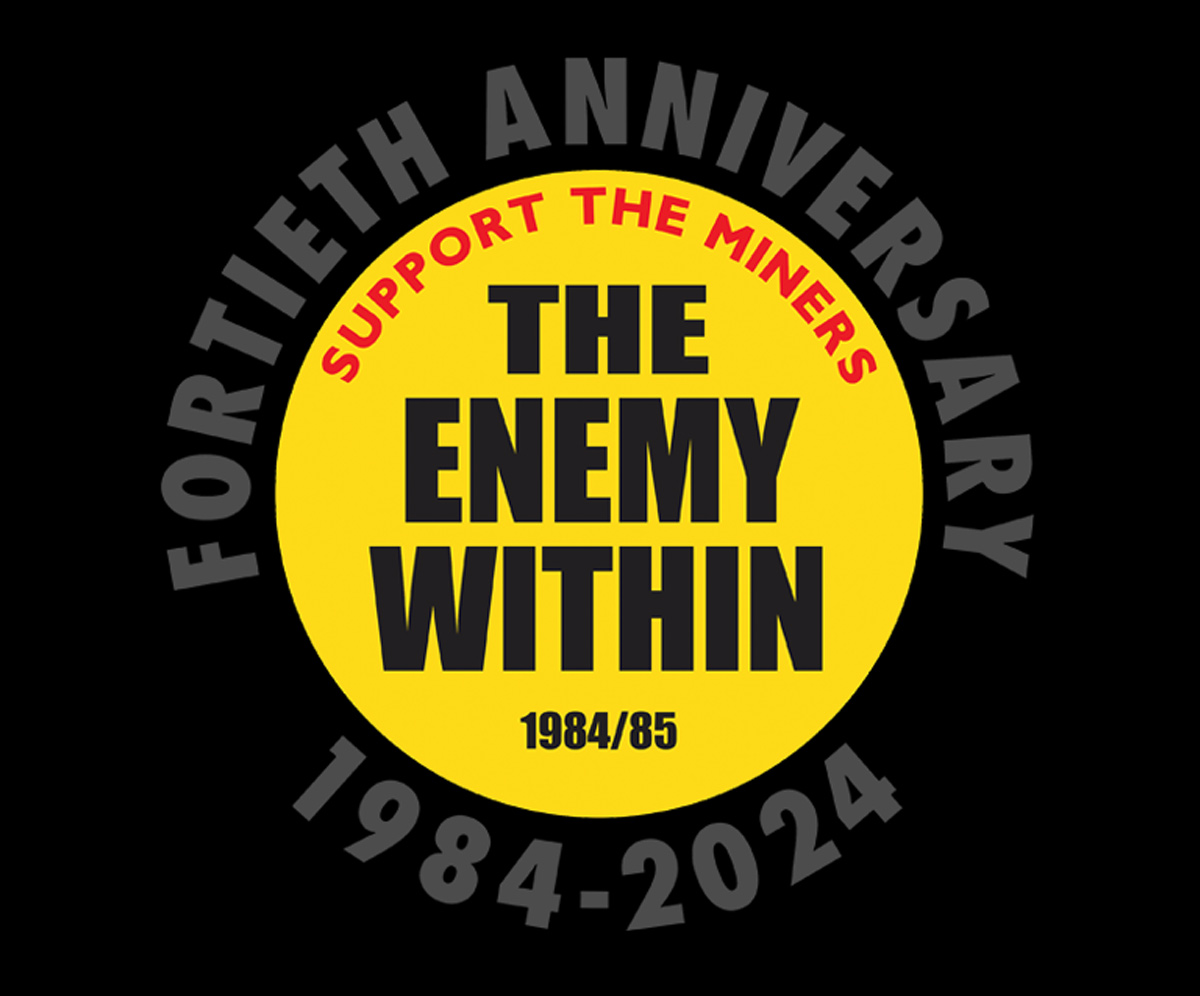
The Enemy Within
24.02.2
Philosophy Football's Mark Perryman digs deep to find for the 40th anniversary
of the start of the 1984-85 Miners Strike an enduring significance

Amidst the 1984-85 Miners strike eruption activist-sociologist Huw Benyon
edited a collection of reports and analyses Digging Deeper. From the coalfields’
frontline his introduction captured the mood of living through this significant
time perfectly:
“The miners’ strike of 1984-85 is a landmark in the political and economic
development of post-war Britain. In the breadth of the issues involved, and in
the drama of its action, it stands out – even to the casual observer – as a
major social and political event. In its compass it is quite staggering. Initiated
by a threat to cut capacity and jobs in the coal industry it is the first major
strike of any duration to be fought over the question of employment. Viewed
in the context of the near calamitous decline of jobs in manufacturing industry,
and the sharp rise in unemployment, the strike stands like a beacon. In the
sincerity of the people involved – women and men – as they talk about the
threat to mining villages, to ‘whole communities’ and to the futures of their
children, the strike evokes a deeply human response. Since March 1984 this
response has been forthcoming from supporters, in groups and as individuals,
throughout Britain and Europe. The yellow stickers of the NUM, 'Dig Deep for
the Miners' and 'Coal not Dole', have spread far beyond the coalfields.”
But the sad fact is the 1984-85 strike proved a landmark in all the wrong ways.
A major social and political defeat, for a trade union, for whole communities,
for an entire body of ideas of what class and solidarity means. A landmark
defeat and one we are still living with the consequences of four decades on.
Does this decry what was achieved in those 12 months? No not a bit of it, but
only if what made this strike such a special event is properly understood. The
spectacular revival of support and solidarity as a key element of Labour's, and
well beyond, organisational culture.
Doreen Massey and Hilary Wainwright's chapter in Digging Deeperargued a
key part of this revival were the Miners Support Groups. They located this
geographically, in the ‘big cities’ that shared a socio-economic situation and
commonality of culture accelerated by the impact of Thatcherism.
“A great mix of industries, including services, and a variety of jobs. Many of
those in work are on low pay, in casual occupations, working in small firms,
and in many areas levels of unionisation are low.”
And what this in part produced as a city’s population was significant too.
“An enormously diverse population: in many cities ethnic minorities, gay and
lesbian communities, women’s groups and ‘alternative’ networks of many
kinds form an important element. The trade union movement is also different
from that in the coalfields. Here its very industrial variety has been the basis
for a tradition of local links and networks. Public sector and white-collar unions
are specially important.”
And they were quite clear that this difference had strengthened rather than
weakened the support for what they called in contrast ‘Coalfield Labourism’:
“It is often anarchistic, socially adventurous, with a commitment to politics
outside the workplace as well as within.”
In London, Merseyside, Southampton, Cardiff, Manchester,York, Glasgow,
Edinburgh, basically everywhere, something stirred in the course of twelve
months. Nor was this limited solely to these ‘big cities’ it stretched also to the
kind of places where hitherto the main opposition to the Tories, or
'Thatcherland’ as they dubbed this huge swathe of England, wasn’t Labour but
the SDP-Liberal Alliance. Cambridge, St Albans, Milton Keynes and Somerset
for starters.
What was it that caused this surge that had been so absent in Labour’s General
Election campaign of ’83? Resonance, a common cause, finding allies, the
forms of organisation adopted, local initiatives as part of a loose yet national
response, the practical focus of collecting food, the emotional impact of
delivering that food, the many ways all of this created what Doreen and Hilary
rather neatly named a politics of 'preaching to the unconverted'..
Perhaps understandably caught up in the moment they concluded with what
proved to be more than a degree or two of over-confidence in what would
follow:
“Labour movement politics will never be the same again.”
The past 40 years have proved, over and over again, how difficult a process
achieving change on the scale, they optimistically imagined had already
happened, actually is. But their conclusion helps us understand why it still
remains worth trying.
“It is not a question of either industrial action or the new social movements,
nor is it one of just adding the two together. What is important is a recognition
of a mutual dependence and a new openness to influence, of the one upon the
other.”
True then, true today and that is what made it worth being an 'Enemy Within'
then and now.
 The Philosophy Football 40th anniversary Enemy Within T-shirt is available from here
The Philosophy Football 40th anniversary Enemy Within T-shirt is available from here
Mark Perryman is the co-founder of the self-styled 'sporting outfitters of intellectual distinction' aka Philosophy Football